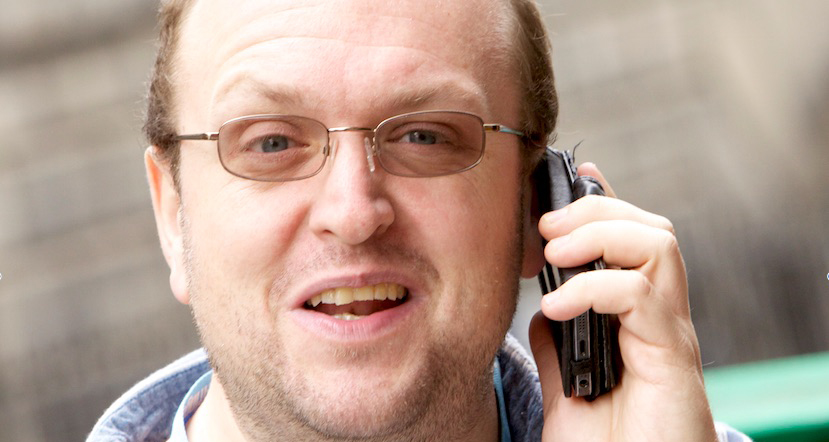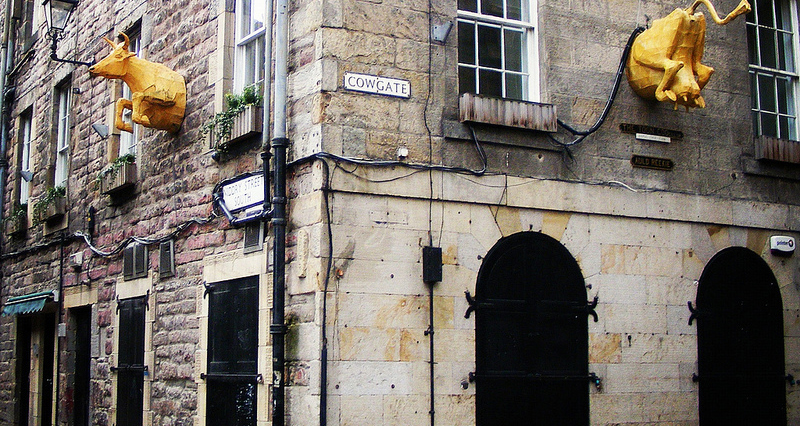Edinburgh Free Festival boss on the Cowgatehead fiasco
 Image: Brian Higgins
Image: Brian Higgins
This year, the Edinburgh Fringe Programme will make the Minoan labyrinth seem like the open plains of the Serengeti (and contain more rogue animals) because of the ongoing Cowgatehead affair.
As a result of it, acts are going to be performing in different venues at different times to where/when they are billed. Or not at all.
The Cowgatehead elevator pitch explanation is that there are four organisations offering ‘free’ shows at the Edinburgh Fringe. In order of appearance: the PBH Free Fringe (so-called after its founder Peter Buckley Hill) from which split off the Laughing Horse Free Festival, Bob Slayer’s Heroes of the Fringe and theFreestival.
Freestival understood they had rights this year to programme acts in the Cowgatehead venue. Now the PBH Free Fringe has those rights. As a result, it has been calculated that (overall) acts will lose at least £77,000.
Over a week ago, I had a long-planned chat with Alex Petty of the Laughing Horse Free Festival (not directly involved in the Cowgatehead fiasco) and I have been sitting on the resultant blog ever since then, awaiting the rumoured sudden announcement of a new venue or venues (unconnected with Alex).
Two days ago, I was told yet another free venue may have been lost because there was no signed contract (again, unconnected with Alex). And not a venue one might have expected. But that (if true) has not yet been announced.
The Edinburgh Fringe thrives on gossip, starts in just four weeks time, the chaos continues… and the most gobsmacking story of the whole Cowgatehead affair (which I believe) seems unlikely to be revealed for several months, if ever. Now there is a tease. I do like a good tease.
Anyway, I met and chatted to Alex Petty of the Laughing Horse Free Festival over a week ago.
“Cowgatehead has been a mess, then,” was the first thing I said to him.
“I think that’s fair to say,” he replied.
“It could be turned into a show,” I said.
“Probably a musical,” suggested Alex. “That’s what usually happens at the Fringe.”
When booked and advertised shows were unceremoniously chucked out of the Cowgatehead, some were given homes by other promoters.
“The Free Festival,” said Alex, “has got about 15 shows that have moved across this year. Bob Slayer has some. And I know Darrell (Martin, of Just the Tonic) has a load. Behind-the-scenes, most venues do help each other. That does genuinely happen. I was lending equipment to Freestival people last year.”
“And,” I said, “The Gilded Balloon had trouble with a new room this year, so the competing Pleasance Dome has let them use one of their rooms. And a couple of years ago, Bob Slayer was short of chairs, so the Underbelly venue gave him some – for free.”
“There is a genuine Fringe community,” said Alex. “The one good thing about the Cowgatehead affair is that people have proved this community idea does happen. I find Peter’s publicity wants to make people believe there is a battle between free and paid venues, a battle between Free Fringe and Freestival and Free Festival but most of the venues just want to get on with it and will help each other out.”
“The whole Cowgatehead thing was unnecessary,” I suggested.
“In reality,” agreed Alex, “if everything that Peter said had happened had happened and Freestival had maybe buggered it up a bit, then if Peter had just put out just exactly what had happened and said We have six spaces rather than nine, so six shows are going to go ahead and we will help out the other shows, finding them other places, then people would have said he was brilliant for saving the venue. But it was the whole way he did it that has made him into a Public Enemy as well.”
“I think,” I said, “the Rubicon was that meeting arranged by Freestival to agree a compromise in London which Peter said he couldn’t go to because it didn’t exist (using the present tense). If that meeting had happened, no act would have lost money or rooms. I think the Free Fringe and Freestival have both (as far as I can see) told the exact truth and, with Peter’s very exact use of present and/or past tenses in what he said, apparently opposite realities can both be true. Did you see the emails between the Free Fringe and Freestival which I posted in my blog? They were both co-operating amiably on all sorts of things. earlier his year.”
“I would suggest,” said Alex, “that Peter had never seen any of those emails. The problem with the Free Fringe which I had, Bob Slayer had and Freestival had was that, as individuals, you think: I could do this better. If we could change that a little bit, that would help. And you genuinely believe you can take things forward. But then you hit a brick wall with Peter.”

“Why did Laughing Horse and PBH fall out?” I asked.
“We worked with him for two years and it gradually got more and more obvious that we had – and it was probably only slightly – different views on how things should work. Obviously, Peter is well-known for his (acts) not-contributing-any-money-for-anything stance unless it’s voluntary. Whereas we suggested acts should bung in a bit of money to go towards printing a programme. It was a hundred little things like that amplified.
“Essentially, after two years, I came to the realisation: This whole thing is being held together by a very narrow, wet bit of string. It’s not working for everyone.Peter wasn’t happy about it. We weren’t happy. What can we do? Let’s go and do our own thing. In our own heads, not really knowing the full psychology of Peter, the whole idea was: We will go and run some free stuff our way – which is basically the way Peter does it, but we take a bit of money and we supply equipment. Same ends; slightly different route getting there. We can maybe both have a brochure together and work together where we can.
“At that point, there were only four venues – Lindsay’s, Canons’ Gait, the Meadow Bar and Jekyll & Hyde. As part of a conversation we had with Peter, we said: If you speak to them and we speak to them, they’ll make a decision about what they want to do. And, obviously, the moment we said that, we were Public enemy No 1.”
“You started Laughing Horse,” I said, “with just one little club in…”
“Richmond,” said Alex. “In March 1999. I’ve never had any sort of plan. I went up to Edinburgh one year and thought:Better do something here. We don’t do so many comedy clubs these days. We still have the one in Richmond. One in Brighton. Edinburgh has pushed us on to doing festivals. We still do our New Act competition each year in the UK. We’re probably associated with 4 or 5 different venues but it’s really moved on to festival stuff.
“We do the Perth Fringe World and Adelaide. So much of the stuff has all sprung from doing Edinburgh. Last year we did the Singapore Comedy Festival for the first time: lots of expat Brits, Americans and locals – a good mix of Malay and Thai and other people doing comedy.”
“You co-run that festival, don’t you?” I asked.
“My job mostly is finding the acts, looking after the acts and maybe giving advice on setting up venues. There’s a couple of people out in Singapore who essentially run it.
“This year, we did three nights of shows in Hong Kong, Manila two nights, Singapore three nights. It worked pretty well. It was fun. Twenty-odd comedians all meeting up in Hong Kong and having ten days together in three countries and figuring out if comedy is ever going to work in Manila.”
“Because?” I asked.
“Because Manila was certainly an experience. It’s the only time I’ve been nose-to-nose with someone who is meant to be the head of a biker gang who says he doesn’t want comedians anywhere near the venue because they’ve had a bit of a falling-out with one of the acts.
“It was completely not the act’s fault. But there was a disagreement with the act and the wife of this guy who was really kicking-off – irate, with hands all over the place. We ended up just basically bundling the comedians out the back door and saying: Let’s not do any more comedy here. He was a really irate man. It was my first trip to the Philippines; never been there before.”
“Are you going to be back in Manila again next year?”
“Yes.”
“So, after this,” I said, “the Cowgatehead kerfuffle was a stroll in the park?”
“Absolutely.”
“Laughing Horse,” I pointed out, “has not done the obvious leap from comedy promotions and venue-running into comedy act management. Why?”
“I like to be out doing shows. Management is just more admin, more sitting in front of a computer, more shuffling numbers and contracts around. We’ve had conversations about Laughing Horse having a small agency but it’s not what I’m interested in.”
“How are you going to expand?”
“Well, Perth has only happened the last couple of years. That is a cracking festival. At the moment, I just produce shows there. I’d eventually like to find a venue to run and push it forward that way. In Adelaide, we’re involved in a couple of venues – one we run; one we co-run. I’ve been at Melbourne two or three years now and I’m hoping to build up and see what happens there. The Sydney Comedy Festival happens in May and that could be added on to the end of Melbourne. We may look at that one year. There’s also the New Zealand festivals that happen in May. So there are some other things out there to look at. Though May clashes with the Brighton Festival back in the UK, which has ended up being the Edinburgh preview festival.”
“Next year?” I asked.
“For Laughing Horse, the plans are more of the same, really. I would like Freestival to continue. The more promoters of free shows there are the better. This nonsense happens at Edinburgh every year in one way, shape or form. It’s chaos. My experience of other festivals around the world is you just turn up and do your thing.
“Why not at Edinburgh? Is it lack of spaces? Is it bigger egos? I don’t know. I think it was Brian Damage who said to me that the Fringe basically is always chaos for everyone but you get there and always get through in the end and that’s a philosophy that has always been true. Somehow it all works. But I don’t think anyone really knows how.”
John Fleming blogs at blog.thejohnfleming.com.



































